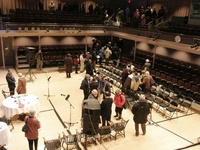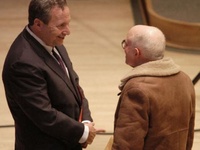“I cannot serve the University...if in the name of comity I find myself saying yes to every request that is put to me, agreeing to every suggestion so as to avoid giving a sense of alienation,” he said.
For the first time, one professor—Professor of Physics and of Applied Physics Daniel S. Fisher—openly called for Summers to resign yesterday.
But several of Summers’ supporters who spoke at the meeting said that Summers’ abilities far outweigh his flaws.
“In my view, President Summers has brought energy and intelligence” to the position, said Cabot Professor of the Natural Sciences Douglas A. Melton.
Professor of Economics David I. Laibson ’88 expressed the hope that the Faculty could reach a middle ground, in which Summers would remain as president and work to improve his flaws.
“I think we can step back from that brink of holding a vote of no confidence,” Laibson said.
Several professors said they are concerned that this controversy will adversely affect Harvard’s ability to recruit graduate students and professors.
“What do I tell my younger colleagues, particularly women, when they ask me about their future at Harvard?” King and Fairbank Professor of Chinese Society James L. Watson asked. “Do I tell them to ignore what they’ve read with their own eyes and focus instead on promises of reform?”
And Physics Department Chair John Huth said that he does not want female professors to join the Faculty “under the cloud of suspicion” that they have been hired for political, rather than academic, reasons.
Summers told the faculty that while he is strongly committed to reform, they must be patient and wait for the changes to take their effect.
“It is not something that can be fixed or addressed in a day” by a single word or administrative act, Summers said.
—Staff writer William C. Marra can be reached at wmarra@fas.harvard.edu.
—Staff writer Sara E. Polsky can be reached at polsky@fas.harvard.edu.










